FIDE launches first digital museum dedicated to chess history

A first-of-its-kind digital museum dedicated to chess provides global access to FIDE’s archive, offering researchers and chess fans a curated look into the game’s evolution As part of its 2024 centenary celebrations, FIDE has unveiled an online museum tracing chess history from ancient times to modern tournaments. The Open Chess Museum endorsed by FIDE aims to become the world’s largest repository of chess artifacts, showcasing valuable items from every corner of the world and every era of chess history. For the first time, a full historical record of chess is freely available online—featuring rare, never-before-seen materials ranging from hand-annotated scoresheets to championship medals and personal artifacts of top players. The project also aims to highlight lesser-known facts and stories from the game’s past. FIDE President Arkady Dvorkovich said the project offers “a closer, in-depth perspective on chess” and reflects “FIDE’s broader push towards digital engagement with the public.” “Chess is one of the oldest and richest sports in history. Over centuries, countless books have been written about the game, the players, the events. Much of this is now available online—but what’s missing is a central, official reference point telling the full story of chess. The FIDE Online Chess Museum is exactly that: a place where you can find key information about the most significant events and the people who shaped the game,” said Dvorkovich. “We hope the chess community—and those curious about the game—see the value in the resources now freely available to explore and enrich the sport,” he added. Visitors navigate the museum through five thematic sections. The “Collection” segment includes photographs, handwritten letters, Olympiad posters, commemorative pins, and personal belongings from famous players—alongside historical documents and autographs. The history section begins with a visual timeline showing all the key stages in the history of chess, up to 1913 and the first steps to create an international chess organization. A dedicated segment traces FIDE’s history from early international efforts in 1913 to its evolution into the sport’s global authority. This part features high-quality photos and scans of documents based on which the chess world is organized and governed. The “World Champions” part includes detailed biographies, annotated games, and key publications chronicling the careers and legacies of the game’s greatest players. The project marks a milestone in chess historiography and signals FIDE’s renewed commitment to public engagement. Following up on FIDE’s slogan – the game is just beginning – the Open Online Chess Museum aims to be a constantly evolving project. FIDE is inviting other collectors, galleries, national federations, clubs and players to join in and have their collections and artifacts also featured on the museum’s website. The museum is free to access via the website museum.fide.com.
Štěpán Hrbek and Tereza Rodshtein crowned Czech Champions
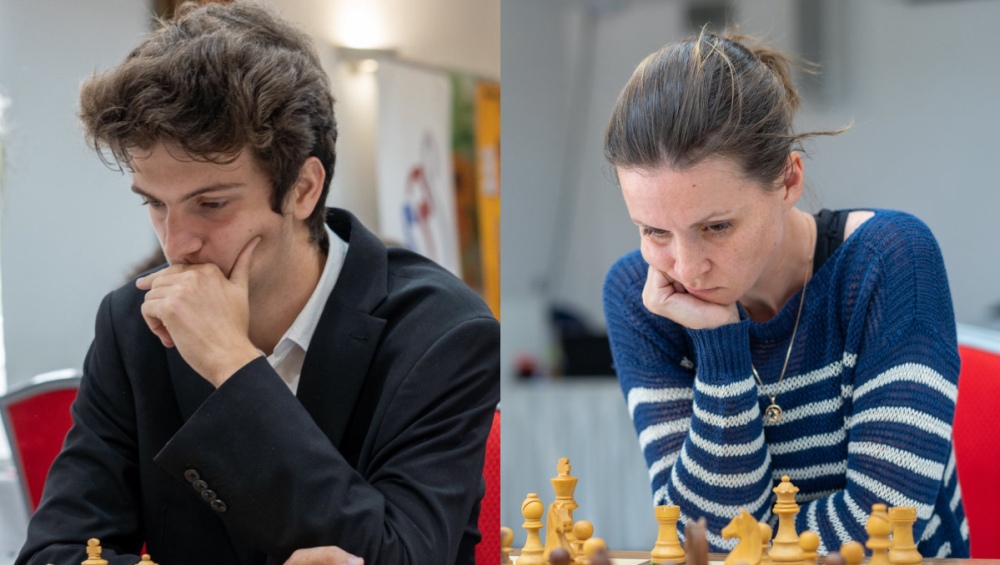
The thrilling final round decided this year’s chess champions of the Czech Republic. In the women’s category, Tereza Rodshtein clinched the title, defeating Julia Movsesian in the final of the elimination tournament. In the open round-robin event, seventh seed Štěpán Hrbek emerged as a surprise winner, while Jan Vykouk and Tadeáš Kriebel claimed silver and bronze, respectively. The Czech Championship returned to Plzeň after a five-year break. While David Navara dominated the 2020 open tournament, this year he did not take part due to a scheduling conflict. Nevertheless, he attended the final two rounds at the Plzeň Congress Center Parkhotel as a commentator—much to the delight of the spectators. The games certainly lived up to expectations: only 22 out of 45 ended in draws. With two rounds remaining, eight of the ten players were still in contention for gold, underscoring the tournament’s competitiveness. Jáchym Němec and Jan Vykouk traded the lead for much of the tournament, but neither managed to convert their chances in the decisive final round. Vykouk drew his game, while Němec lost—to none other than 19-year-old Štěpán Hrbek, who thereby secured his unexpected national title. His final score of 5.5/9 reflected the remarkable balance of the event. The pre-tournament favorites struggled: Václav Finěk finished fifth, and Štěpán Žilka placed eighth. Final standings Open The women’s championship, held for the third consecutive year in a knockout format, began with a preliminary round followed by quarterfinals, semifinals, and the final. Each round featured two classical games, two rapid games, blitz, and, if necessary, an Armageddon decider. Several junior players also participated but were unable to match the experience of their older opponents. Tereza Rodshtein overcame all challengers on her way to the title, defeating Karolína Pilsová, Anna Lhotská, and finally two-time defending champion Julia Movsesian. In the bronze medal match, Kristýna Petrová outplayed Anna Lhotská. Tournament director and Chairman of the Czech Chess Association Martin Petr reflected positively on the event: “I am thrilled with the course of this year’s Czech Championship. I would like to thank all the players for their fighting spirit and fair-play approach. The spectators certainly enjoyed the exciting games and the tournaments—and I did too.” The organizer, Chess Club 64 Plzeň, expressed gratitude to all who supported the 2025 Czech Championship: the City of Plzeň, the Czech Chess Association, Plzeňská teplárenská, Parkhotel Plzeň, Ubytování U Foltýnů, PROdiamant, Calliditas Edutainment, NODAK, and the 64 Foundation. This article is based on a report by the Czech Chess Federation Official website: chess.cz/
FIDE September 2025 rating list: Vincent Keymer debuts in top 10 Open
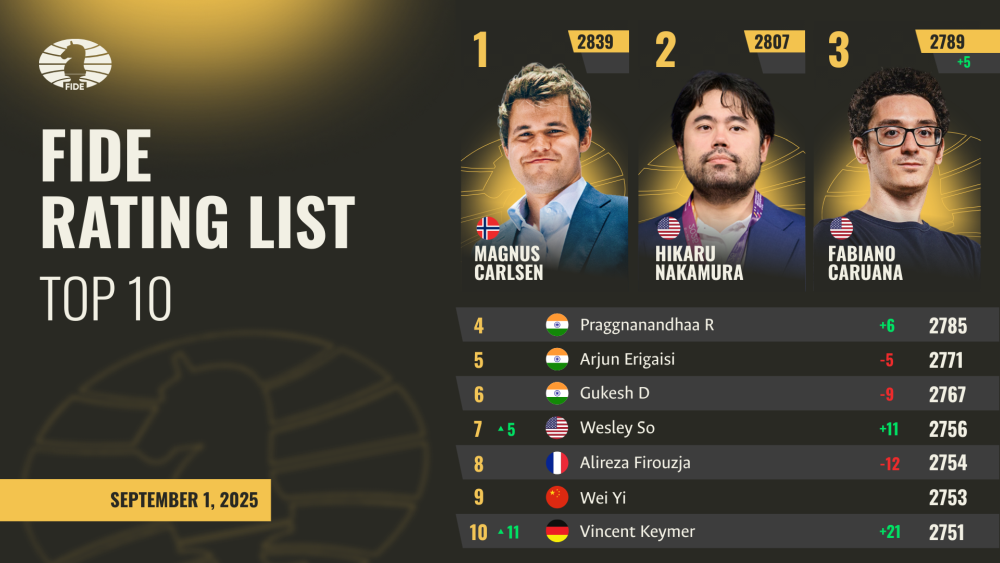
The September 2025 rating list was shaped primarily by results from the Sinquefield Cup, Quantbox Chennai Grand Masters, 61st International Akiba Rubinstein Chess Festival, and the Spanish League Honor Division 2025 – a Swiss team tournament held in Linares. The top 10 Open saw several notable changes in August. Wesley So returned to this elite group after a ten-month absence, thanks to his victory at the Sinquefield Cup, which earned him 11 rating points. Rameshbabu Praggnanandhaa also shone this competition, adding 6 points and reaching a career-high rating of 2785. Photo: Rafal Oleksiewicz The biggest breakthrough came from Vincent Keymer, whose dominant performance at the Quantbox Chennai Grand Masters brought him 21 rating points and secured his first-ever place in the world top 10. In the women’s rankings, Zhu Jiner continued her steady climb. A strong showing in the Isbank of Türkiye Chess Super League netted her 12 points and lifted her to a career-best 2548. Biggest gains in top 100 Open and Women Abrahamyan, Tatev WGM USA 2407 (+64) Batsiashvili, Nino GM GEO 2469 (+28) Alekseenko, Kirill GM AUT 2674 (+22) Keymer, Vincent GM GER 2751 (+21) Yakubboev, Nodirbek GM UZB 2681 (+18) Ouellet, Maili-Jade WGM CAN 2348 (+17) Fataliyeva, Ulviyya IM AZE 2385 (+16) Tsolakidou, Stavroula IM GRE 2445 (+14) Andreikin, Dmitry GM FID 2710 (+15) Wojtaszek, Radoslaw GM POL 2661 (+13) The month’s biggest rating gainer was Tatev Abrahamyan, who scored an impressive 63 points at the Budapest One Week 2025. With this performance, the American WGM crossed the 2400 threshold for the first time and soared to a career-high 37th place in the women’s top 100. Photo: Michal Walusza Other strong performances came in the Spanish League Honor Division 2025, where Nino Batsiashvili, Kirill Alekseenko, Stavroula Tsolakidou, and Ulviyya Fataliyeva all collected valuable points. Meanwhile, Maili-Jade Ouellet significantly boosted her rating after an excellent showing at the Championnat Invitation du Québec 2025. Photo: Dolnośląski Związek Szachowy At the 61st International Akiba Rubinstein Chess Festival, Nodirbek Yakubboev won the round-robin event, gaining 16 points, while runner-up Radosław Wojtaszek added 13 to his tally. Finally, Dmitry Andreikin marked a successful return to classical chess after a ten-month break, earning 15 points with a solid performance in the Isbank of Türkiye Chess Super League.
FIDE Grand Swiss 2025: Expect the unexpected in Samarkand
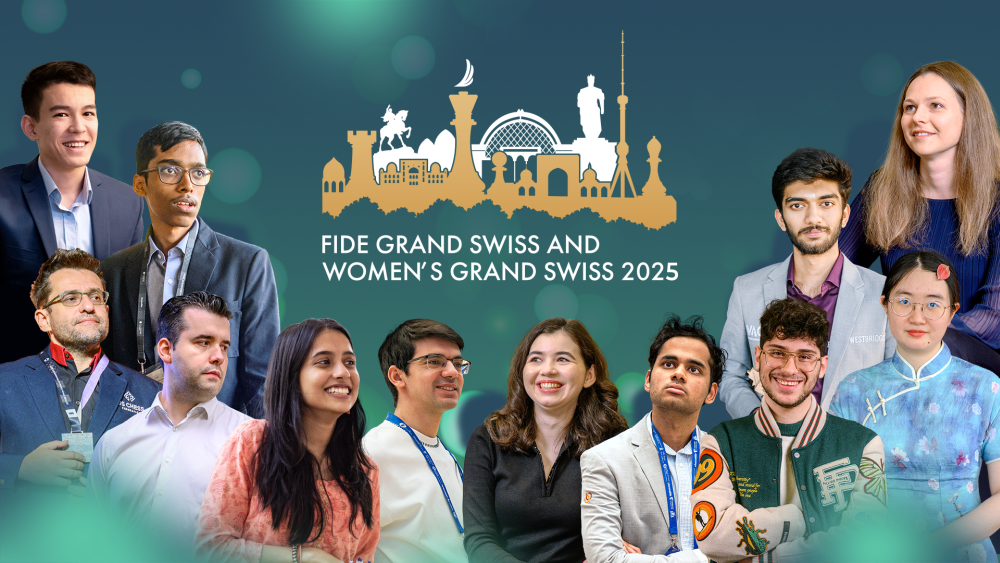
For two weeks in September, the ancient capital of the Silk Road will be home to many of the best chess players in the world. When talent, youth, experience, and ambition collide, uncertainty is the only rule. Since its initiation in 2019, the FIDE Grand Swiss – held every two years – has distinguished itself as the strongest classical chess tournament. Featuring 11 rounds played under the Swiss system it is a battleground where the best face the best and only exceptional performance can secure victory. This is hardly surprising given what is at stake – substantial prizes and coveted qualifying spots for the 2026 Candidates Tournament in the Open and Women’s categories. The total prize fund amounts $855,000, with $625,000 allocated to the Grand Swiss and $230,000 to the Women’s Grand Swiss. The primary qualification goal of the tournament is clear: the top two finishers in both the Open and Women’s events will secure their places in the 2026 Candidates, which will decide the next challenger for the World Championship title. “The Grand Swiss has always stood as a unique tournament and one of the most anticipated events in the FIDE calendar. We are pleased that it will be taking place in Uzbekistan – a great chess nation which is investing in the sport and has a proven track record in organising major chess events,” FIDE President Arkady Dvorkovich said. “The rising youth dominating the chess scene in recent years will be tested in Samarkand, facing many of the most seasoned players on the planet. I am very much looking forward to the clash of generations. Overall, I believe that this tournament will have a strong positive impact on the promotion of chess, not just in Uzbekistan or central Asia, but much more broadly,” he added. The unpredictable winners of the Grand Swiss A look at the previous editions of the Grand Swiss – three in the Open and two in the Women’s category – shows that one thing is clear: once the games start, there isn’t much difference between the rating favourites and the underdogs, and nothing is certain until the end. In 2019, underdog Wang Hao emerged as the winner after a lucky victory over David Howell. The Chinese GM edged out the favourite, Fabiano Caruana, thanks to a better tiebreak. In that tournament, the then 23-year-old Kirill Alekseenko stunned the field, finishing in third place. Then in 2021, in Riga, Alireza Firouzja made his big mark on the global scene by overcoming seasoned GMs and winning the tournament outright. In a field dominated by youth, the experienced player Alexei Shirov delivered a great performance, tying for third place and earning a spot in the 2022 FIDE Grand Prix. In 2021, the inaugural Women’s Grand Swiss was held, which was marked by Lei Tingjie’s, securing the title with a round to spare. In the third edition, held at the Isle of Man in 2023, Firouzja faltered and finished in the middle of the scoreboard, but it was the Indian players who stole the show, with Vidit Santosh Gujrathi capturing the Open and Vaishali Rameshbabu triumphing in the Women’s competition. Vidit, despite losing in round one, rallied brilliantly to finish half a point ahead of Hikaru Nakamura. Players to look out for at the 2025 Grand Swiss This year’s Grand Swiss will see 116 players take part in the Open, including the World Champion Gukesh D, and 56 in the Women’s tournament. The Open tournament field is formidable. Eighteen players boast ratings above 2700, placing them in the Super-GM category, alongside 74 GMs rated 2600–2699 – world-class competitors capable of toppling anyone. With top contenders hailing from chess powerhouses such as India, the U.S, France, Germany, China, the competition will be fierce. Photo: Maria Emelianova Rameshbabu Praggnanandhaa, the current leader of FIDE Circuit, headlines the ranking list in Samarkand. The Indian youngster – who only turned 20 on August 10 – is already a seasoned player having dominated many tough tournaments and represented his country in Olympiads and team events. Praggnanandhaa is enjoying a career-best year as he became the top-ranked player in his native India and fourth in the world, his highest placement so far. Most recently, Praggnanandhaa was the runner-up of the Sinquefield Cup, which secured him a place in the playoff stage of the Grand Chess Tour. The superb strength and performance he has had this year so far has put Praggnanandhaa at the top of the favourites to win the Grand Swiss. Another title hopeful is Gukesh D – the 19-year-old World Champion who has made history several times already, most notably by becoming the first Indian to breach the 2750 ELO barrier, as well as being the youngest-ever winner of the Candidates and later on World Champion. Gukesh has had a bright year so far – finishing as the runner-up at Tata Steel and taking third place in Norway Chess, where he defeated Carlsen and Nakamura. Gukesh’s strength and world crown make him an exceptionally strong favourite in the tournament, but his status also makes him a prime target for many of the players in the Grand Swiss. The 19-year-old is already renowned for his focus and for managing to keep his nerves steady. Whether he does that in Samarkand will be decisive for his performance in the Grand Swiss. Arjun Erigaisi, India’s third big hope at the event, is also in strong form. A former national number one, he’s now ranked among the best players in the world. Then there’s Vidit Santosh Gujrathi, the 2023 Grand Swiss winner chasing for another title. Other top players in the race include the 2021 Grand Swiss winner, 22-year-old Alireza Firouzja, who captured another Bullet Chess Championship title in 2025, had a solid performance at the Superbet Rapid & Blitz and was a runner-up in the Esports World Cup, losing to Magnus Carlsen. Photo: Rafal Oleksiewicz Germany’s Vincent Keymer is another one to watch out for – the winner of the German Championship, Keymer is
FIDE Grand Swiss 2025: Updated dress code offers more flexibility
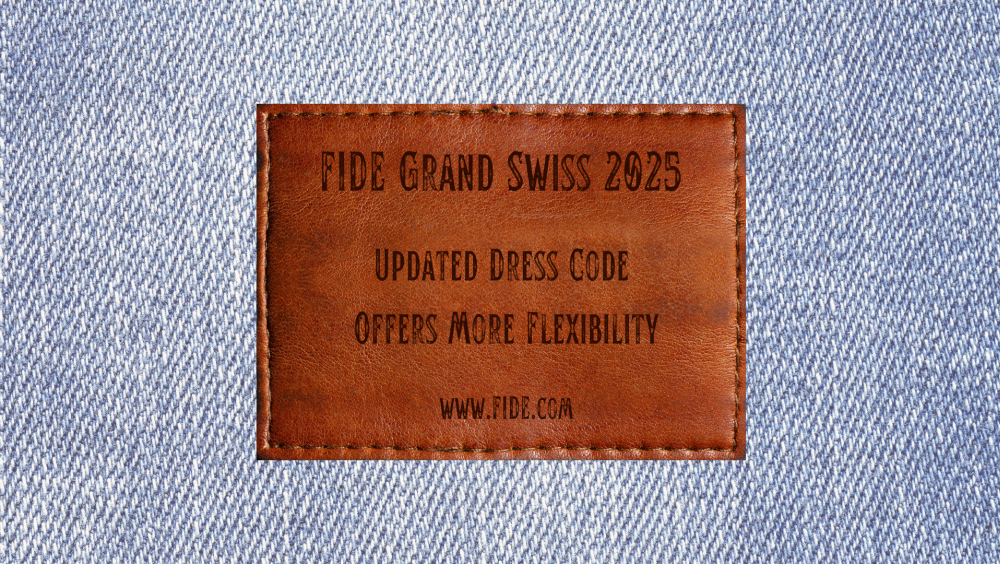
FIDE is pleased to publish the dress code for the FIDE Grand Swiss and FIDE Women’s Grand Swiss, reflecting a modern and inclusive approach while preserving the elegance of our sport. Key update Appropriate jeans are now permitted as part of the official dress code. This change offers players more comfort and freedom of choice, while ensuring that the overall appearance of the event remains professional and respectful. Dress code guidelines Men: Suit Dark business casual trousers, including classic, non-distressed jeans (blue, black, and grey) Unicoloured shirt (with minor deviations allowed, e.g. checkered or striped) Dress shoes and loafers with closed toes Unicoloured sneakers (soles can be a different colour) Women: Skirt suit, pantsuit, dress suit Dress Dark business casual trousers, including classic, non-distressed jeans (dark blue, black and grey) Shirt/blouse Dress shoes and loafers with closed toes Unicoloured sneakers (soles can be a different colour) FIDE’s perspective FIDE President Arkady Dvorkovich highlighted the spirit of the change: “FIDE took the decision to provide more flexibility in the dress code. It is still required to follow the official standards, but elegant, appropriate jeans are also allowed. FIDE, chess players, arbiters, and officials must collectively strive to preserve the integrity of chess while also ensuring that the sport remains appealing to the audience and sponsors.” With this update, FIDE reaffirms its commitment to both tradition and progress — creating an environment where players feel comfortable and confident, while the game continues to shine on the world stage.
Fujairah Global Chess: Pranav V and Sanan Sjugirov share the lead at midpoint
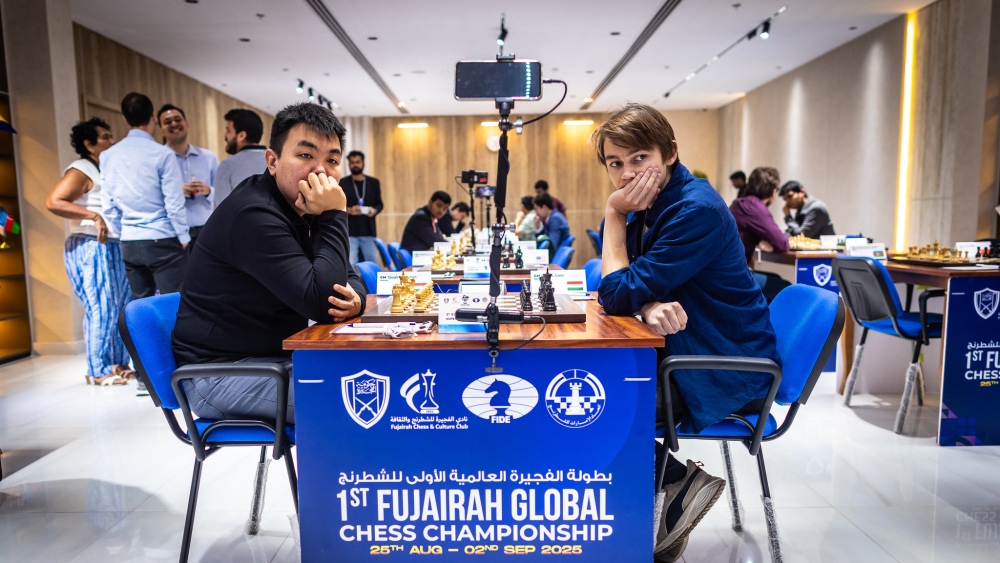
The inaugural Fujairah Global Chess Championship 2025 has passed its midpoint. After five exciting rounds, leaders have emerged in all three groups: Superstars, Masters, and Open. In the Superstars section, India’s GM Pranav V and Hungary’s GM Sanan Sjugirov are joint leaders with 4 points each. Close behind on 3.5 points are Azerbaijan’s GM Aydin Suleymanli, USA’s GMs Brandon Jacobson and Andrew Hong, China’s GM Zhu Jiner, and Iran’s GM Amin Tabatabaei. In Round 5, the top board clash between Brandon Jacobson and Amin Tabatabaei in the Queen’s Gambit Declined Exchange Variation ended in a draw. Jacobson had the upper hand for most of the game, but a mistake on move 34 in the queen endgame allowed Tabatabaei to equalize. After a series of exchanges, the game concluded in a bare-king draw after 57 moves. On Board 2, Pranav V scored an impressive victory with White against Mexico’s GM Jose Eduardo Martinez. Playing the Sicilian Rossolimo, Martinez sacrificed a pawn in the opening to damage Pranav’s pawn structure. However, the Indian maintained balance through his knight’s activity. On move 19, Martinez’s decision to open up the kingside with his f-pawn backfired. Later, in an attempt to complicate matters, he sacrificed an exchange, but Pranav demonstrated accuracy and converted the advantage smoothly, winning in 47 moves. On Board 3, Sanan Sjugirov continued his excellent run by defeating compatriot GM Gleb Dudin. Playing the Vienna Opening with White, Sanan surprised his opponent in the opening and kept a firm grip throughout the game, finally clinching victory after 51 moves. Meanwhile, on Board 4, the tournament’s only female participant, China’s GM Zhu Jiner, impressed once again. Playing Black against Aydin Suleymanli, she obtained a nearly winning position several times but missed her chances in the endgame, allowing the game to be drawn after 64 moves. On Board 5, India’s GM Raunak Sadhwani, with White, was unable to convert a winning rook endgame against USA’s GM Andrew Hong (pictured below). A crucial miscalculation by Raunak allowed Hong to escape, and the game ended in a draw. All games begin daily at 15:00 CET and are broadcast live. The tournament is conducted in full compliance with anti-cheating regulations, with all players thoroughly checked before entering the playing hall. The inaugural edition of the Fujairah Global Chess Championship attracted enormous attention worldwide — uniting over 530 participants from 70 countries. Thanks to the Fujairah Chess & Culture Club and the event sponsors, the tournament has been organized at the highest level. Superstars standings after Round 5 Masters standings after Round 5 Open standings after Round 5 Fans can follow the live broadcast of the 1st Fujairah Global Chess Championship 2025 on the Fujairah Chess and ChessBase India Hindi YouTube channels, and also check full results via Chess-Results. Written by Pavel Dvorkovich & Niklesh Jain Photos: Anna Shtourman, Vivek Sohani and Aditya Sur Roy YouTube Fujairah Chess YouTube ChessBase India Hindi Photos are available on Flickr: flickr.com/photos/203288106@N04/albums
5th Intercontinental Online Chess Championship for Prisoners: Registration continues
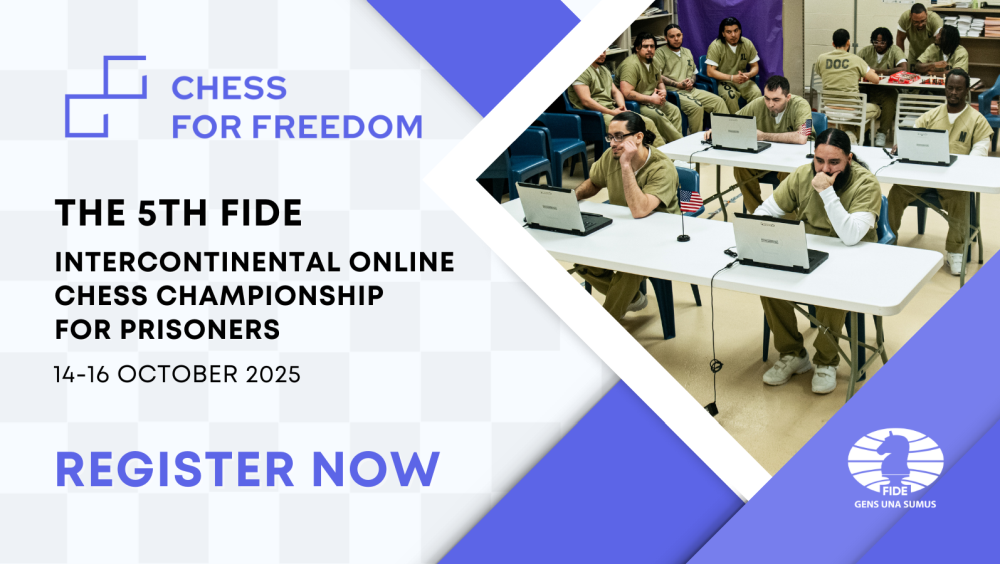
The countdown is on for the 5th edition of the FIDE Intercontinental Online Chess Championship for Prisoners, scheduled for October 14-16, 2025. Held as part of the Chess for Freedom project and the FIDE Year of Social Chess, this unique event brings correctional facilities from every continent together through the game of chess. Teams from the USA, Paraguay, Croatia, Italy, Australia, Czech Republic, Jersey, Portugal, Lithuania, Georgia, Singapore, Jamaica, Mexico, Trinidad and Tobago, Kazakhstan, UAE, Ghana, Bulgaria, Zimbabwe, and Eswatini have already confirmed their participation. With more entries expected, this year’s edition is shaping up to be truly diverse and international. Registration remains open, and correctional institutions worldwide are invited to join this global initiative. Registration Participation is free of charge Each country may enter up to three teams: men’s, women’s, and youth (under 20) Teams may include inmates from one or multiple facilities Registration deadline: September 14, 2025 Event details Platform: Chess.com Time control: 10 minutes + 5 seconds increment Group stage: October 14 Championship round: October 15 Finals: October 16 Correctional institutions can register by completing the official form and confirming their entry via email to Tournament Organizer Mikhail Korenman (mikhail.korenman@ccsheriff.org). Now in its fifth year, the Intercontinental Championship for Prisoners has become a cornerstone of the Chess for Freedom program. The tournament offers incarcerated individuals the chance to represent their institutions on the international stage, develop skills that encourage discipline and critical thinking, and connect with a wider community beyond prison walls. By promoting education, rehabilitation, and inclusion, the event continues to show the constructive role chess can play in preparing individuals for reintegration into society. FIDE looks forward to welcoming even more teams to this year’s event.
FIDE Announces final decision on the case of Kirill Shevchenko
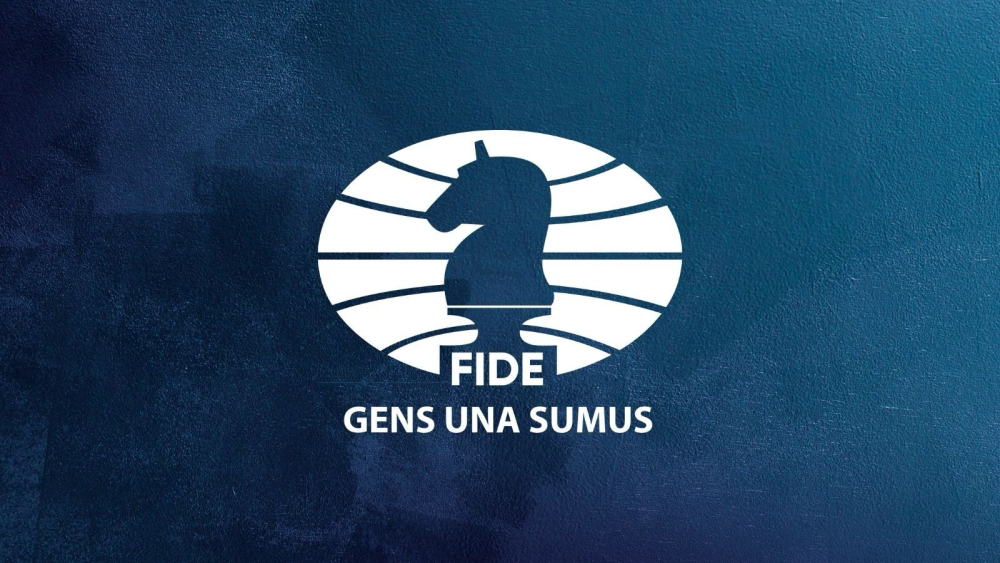
The FIDE Ethics & Disciplinary Commission (EDC), in its Appeal Chamber, has issued its final decision in Case No. 06/2024: “Alleged cheating at the Spanish Team Championship”. The appeal panel, led by Chairperson Mrs. Yolander Persaud with members Mr. Khaled Arfa and Mr. Ravindra Dongre, has strengthened the earlier sanctions imposed by the First Instance Chamber (Chaired by David Hater, together with Olga Baskakova and Alan Borda). The Chamber considered both an appeal of Kirill Shevchenko and a cross-appeal of the FIDE Fair Play Commission (FPL), dissatisfied with certain findings made by the EDC First Instance Chamber and the sanction imposed. Having considered all arguments, the Appeal Chamber has decided, by unanimity of its members, that the appeal by Kirill Shevchenko fails and the guilt is confirmed, whereas a cross-appeal of FPL succeeds and accordingly, the first-instance decision was changed as follows: Respondent GM Kirill Shevchenko, found guilty under Article 11.7(e) of the FIDE Disciplinary Code. Sanctions: A three-year worldwide ban from all FIDE-rated events. One year of the ban suspended, contingent on the absence of further misconduct. The ban runs from 19 October 2024 until 18 October 2026, with the suspended portion in effect until 18 October 2027. The Grandmaster title is revoked effective from the date of publishing this decision. Dana Reizniece, Deputy Chair of the FIDE Management Board, underlined FIDE’s firm commitment to chess integrity: “FIDE takes cheating cases among top players with the utmost seriousness. We are working hard on both prevention and swift, appropriate sanctions. Ensuring fair play is non-negotiable – it is essential to the credibility and future of our sport.” This reflects increasing efforts across FIDE divisions – including Fair Play, Arbiters, and Ethics – to strengthen detection systems, refine preventive training, and ensure swift disciplinary response when needed. The full text of the decision can be found here: ethics.fide.com/wp-content/uploads/2025/08/Case_06_2024A_decision_final.pdf
Wesley So wins 2025 Sinquefield Cup

Wesley So emerged as the winner of the 2025 Sinquefield Cup, edging out Fabiano Caruana and Rameshbabu Praggnanandhaa in a dramatic blitz playoff. The American grandmaster, who was born in the Philippines, replicated his 2016 success by winning this prestigious event for the second time. The 2025 Sinquefield Cup—the final classical event and concluding leg of the Grand Chess Tour season—featured a $350,000 prize fund and took place at the World Chess Hall of Fame in St. Louis, Missouri, from August 18–28. With an exceptionally strong field, the event was fiercely contested, ending with three players tied for first place on 5.5/9. Caruana seized an early lead after scoring back-to-back wins over defending champion Alireza Firouzja and Nodirbek Abdusattorov. Praggnanandhaa, who opened his campaign with a brilliant first-round victory against World Champion Gukesh D, caught up with the leader in Round 7 after defeating Firouzja. That same round marked a turning point for So, who finally broke his streak of six straight draws by overcoming Gukesh and joining the race for first place. Heading into the final round, Caruana and Praggnanandhaa led with 5/8, closely followed by Levon Aronian and So on 4.5/8. First, Maxime Vachier-Lagrave made a quick draw with Jan-Krzysztof Duda, securing the top position in the overall GCT standings. Then Aronian, taking a pragmatic decision, split the point with Praggnanandhaa, a result that guaranteed both players spots in the 2025 GCT Finals. Caruana’s draw with Gukesh left So with a chance to force a tie for first. Rising to the occasion, So outplayed Abdusattorov, scoring a victory on demand and joining the leaders. A three-way blitz playoff was held to determine the champion. In the first game, Praggnanandhaa defeated Caruana after capitalizing on a crucial mistake by the American on move 24. In the second, So dismantled Praggnanandhaa’s queenside defense, forcing resignation. With this win, Wesley needed only a draw against Caruana to clinch the title—and he delivered, achieving this so-much-needed result after a hard-fought battle. Despite his triumph in the Sinquefield Cup, So narrowly missed qualification for the Grand Chess Tour Finals, falling short by just half a point. The Finals, featuring Maxime Vachier-Lagrave, Fabiano Caruana, Levon Aronian, and Praggnanandhaa R, and will be held from September 28 to October 3 in São Paulo, Brazil. Photos: Lennart Ootes and Crystal Fuller | Saint Louis Chess Club Official website: grandchesstour.org/
Call of interest for panels of arbiters and world events 2026-2027

Dear colleagues, International and FIDE arbiters, According to the new Regulation B.06.4 FIDE Regulations for the Appointment of Arbiters in World Events (effective from July 20th 2023), the FIDE Arbiters’ Commission is proud release a new process for the selection of arbiters in the Panels (Green, Blue, Red and Yellow) for the next cycle 2026-2027. The call of Interest for Panels of arbiters and World Events 2026-2027 is open for one month, from August 28th 2025 to September 27th 2025, 23:59 CEST for all FIDE Arbiters and International Arbiters with a valid FIDE license. All arbiters who wish to officiate in World Events have to submit their application via Chamilo* (https://arb-learn.fide.com/). * Chamilo is the ARB Training Portal, which we are using to support the process. We will take advantage of the call of interest to include colleagues who haven’t followed training sessions yet under this new system. Survey link >>> Please fill in this survey to help us identify your wishes and availability for the Panels and World Events scheduled in 2026-2027. Arbiters will be assigned according to the Regulations (B06.4), depending on their experience, to panels which will be used to assign positions in tournaments. GENS UNA SUMUS! IA Ivan SyrovyChairman FIDE Arbiters’ Commission IA Nebojsa BaralicSecretary FIDE Arbiters’ Commission
Winners crowned at the 23rd European Union Youth Chess Championship
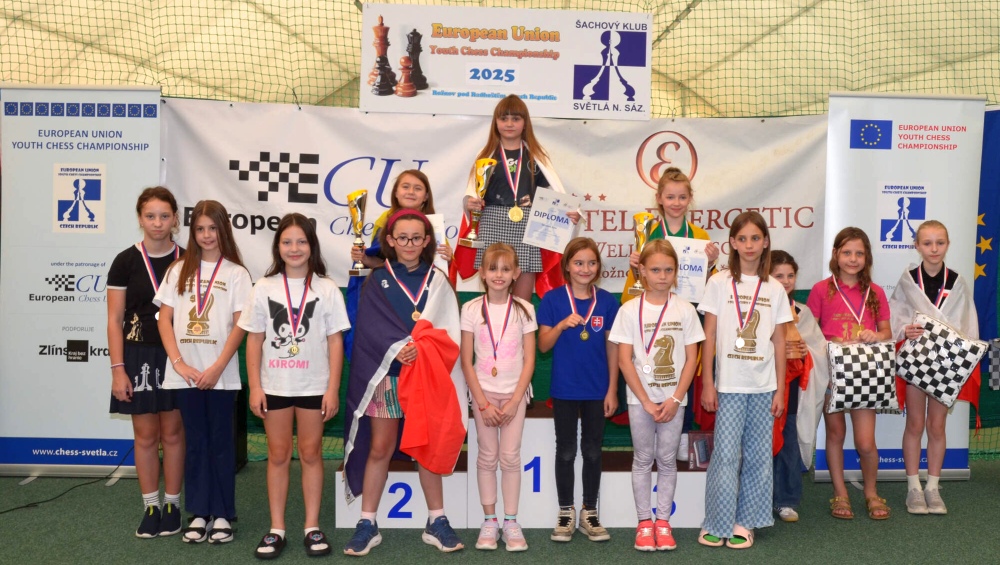
The 23rd European Union Youth Chess Championship 2025, organized by Šachový klub Světlá nad Sázavou under the patronage of the European Chess Union (ECU) and in cooperation with the Czech Chess Federation, concluded on Wednesday, August 27, in Roznov pod Radhostem. After final rounds full of fighting spirit and tension, the winners emerged in all categories: U8 Boys Lev Jevglevski (EST, 9 out of 9!) David-Christian Talaba (ROU) Daniel Sava (ROU) U8 Girls Sophia-Lenina Matala (ROU) Sare Adam (FRA) Pausader Ines Bravo (FRA) U10 Boys Filip Sirbu (FRA) Matelo Vinet (FRA) Thomas Lobina (FRA) U10 Girls Julia Szczurek (POL) Melania-Cristina Grigore (ROU) Karina Ser (LTU) U12 Boys Matvii Bilochenko (POL) Alexandru-Daniel Pasca (ROU) Krisjanis Lazars (LAT) U12 Girls Maelys Manouvel (FRA) Lila Rzadkowska (POL) Agnieszka Slusarczyk (POL) U14 Boys Andrii Diachek (POL) FM Vlad Petroff (ROU) Simon Matejka (SVK) U14 Girls Tess Hujova (CZE) Kaja Rzadkowska (POL) Olga Debowska (POL) Complete results are available HERE. The top three finishers in each category received a cup and a diploma. All participants were awarded a commemorative medal, and the eight European champions each won a laptop. The next five players in each category also received valuable prizes. Additionally, every player was given a tournament T-shirt featuring the EUYCC logo. The prizes were presented by the event director, Zdenek Fiala. The organizers also awarded special prizes for the best game in each of the final four rounds. The recipients of these brilliance awards were: Pastor Zuccolo Matteo (FRA), Melania-Cristina Grigore (ROU), Lila Rzadkowska (POL), Daniel Belocky (CZE), Sare Adam (FRA), Evienne Jongejan (NED), Klara Svabova (CZE), Kaja Rzadkowska (POL), Lev Jevglevski (EST), Julia Szczurek (POL), Alexandru-Daniel Pasca (ROU), Zsofia Bolla (HUN), Ines Bravo Pausader (FRA), Karina Ser (LTU), Yanis-Andrei Ganea (ROU), and FM Vlad Petroff (ROU). The organizers extend their gratitude to all players for their performance and fair play, to the parents and coaches for their cooperation, to the arbiters for smoothly running the tournament, and to all partners for their support. The next edition of the European Union Youth Chess Championship U8-14 will also be held in Roznov pod Radhostem from August 17 to August 26, 2026. Written by Zdenek Fiala, director Sachovy klub Svetla nad Sazavou Photo gallery: rajce.idnes.cz/sachysvetla/album/euycc-2025 Official website: chess.cz/mistrovstvi-evropske-unie/

